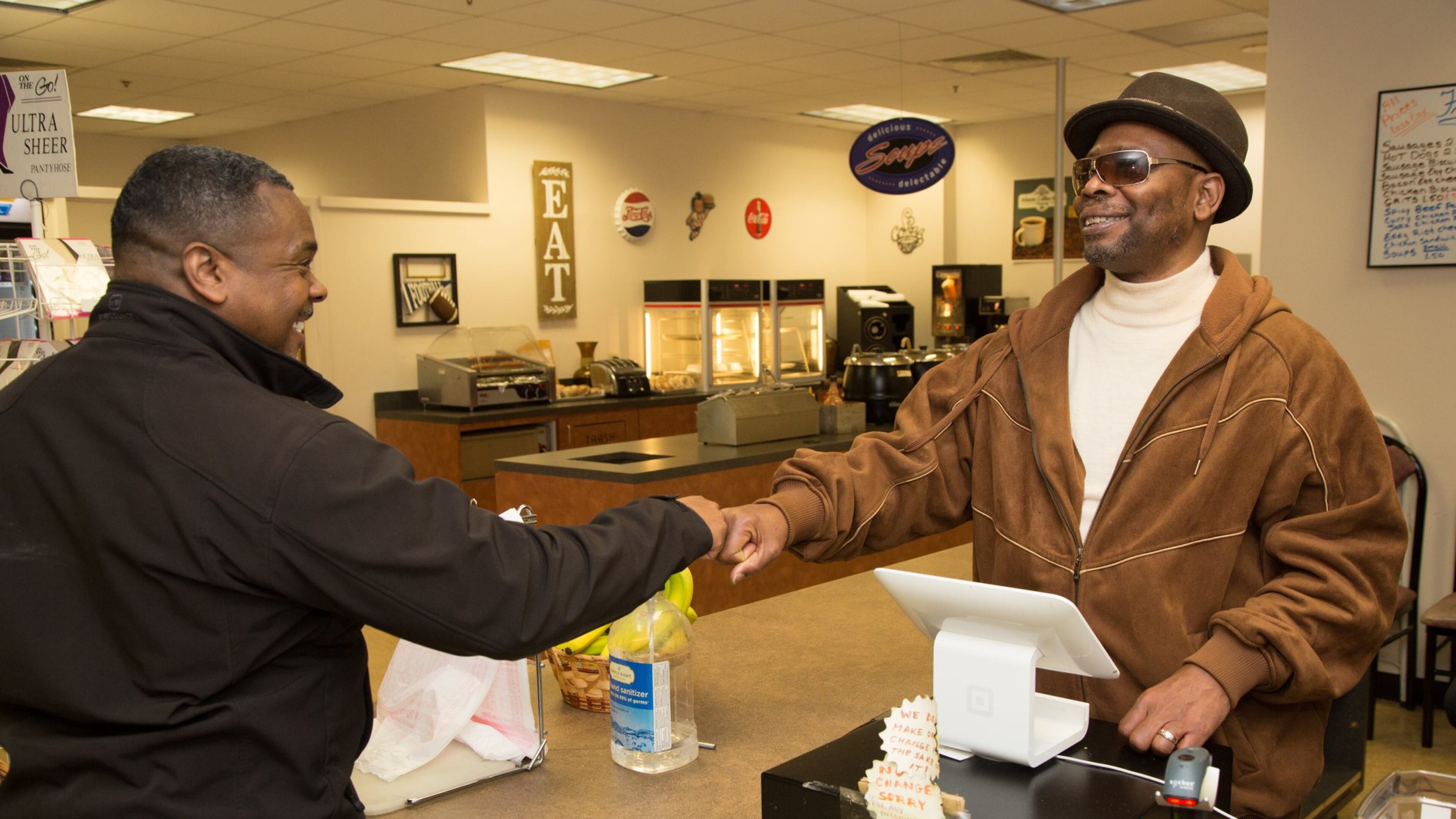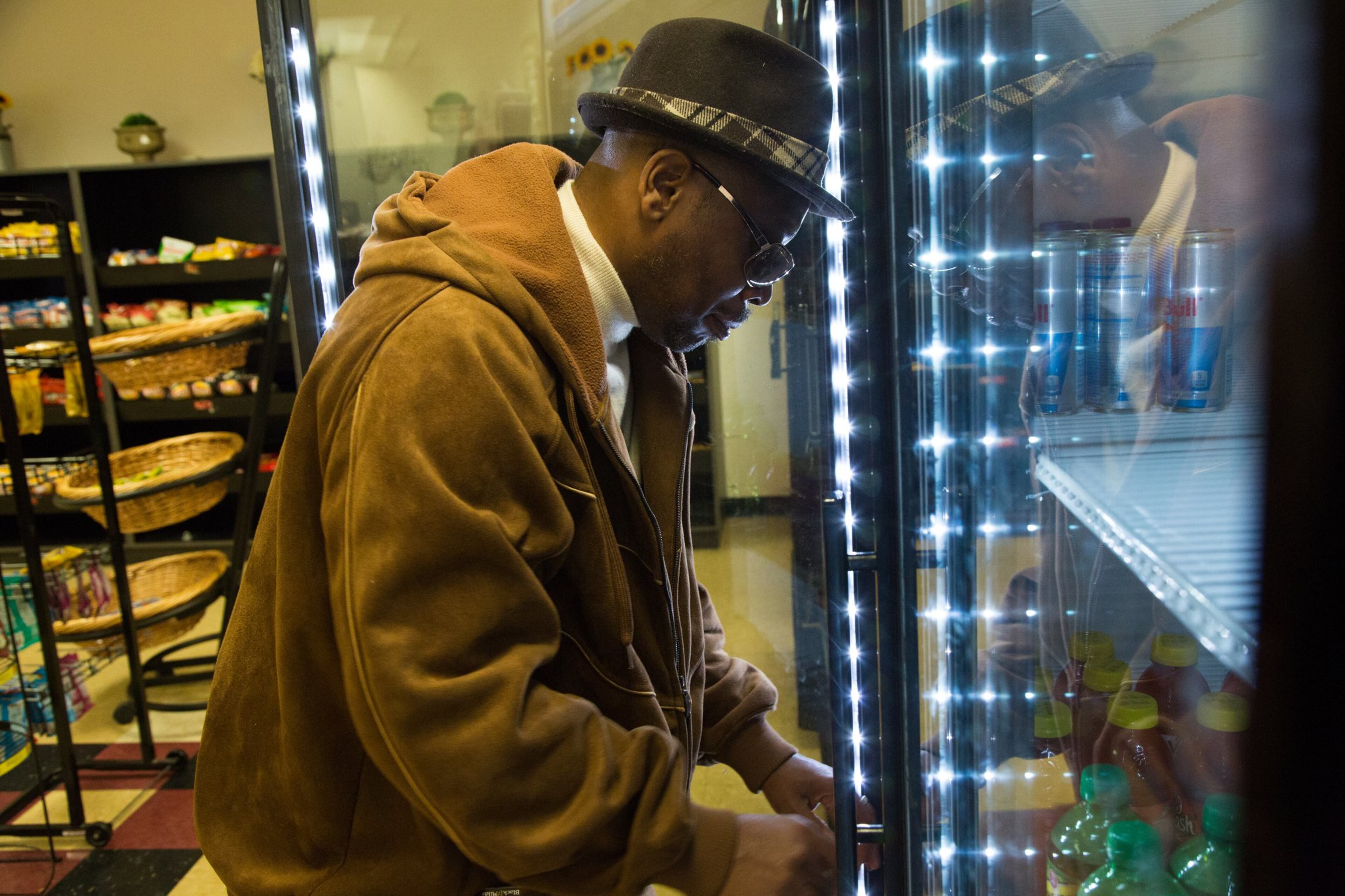Blindness doesn’t hold back DeKalb shopkeeper

Edward “Eddie” Mial Jr. grew up with zero confusion about how to live an appreciative life. His father, a 20-year police patrol officer in Philadelphia, taught him to stand up to his problems and blame no one but himself if things went south.
“I can still hear what he said about 30, 40 years, ago,” said Mial of his father, who passed away in 2015. “It’s on you, nothing else. You don’t have no fingers to point to but yourself.”
The unshakable lessons of the father are what have pulled the son out of some of the most difficult times of his life. A juvenile diabetic at age 3, Mial lost his sight from complications of the disease about 15 years ago.

But you would never know it. The 53-year-old Mial runs a well-stocked snack shop in the basement of the DeKalb County Courthouse on North McDonough Street in Decatur. He is among more than 75 small-business operators who are part of Georgia's Business Enterprise Program, an offspring of a federal program established in the 1930s to tap the entrepreneurial skills of the visually impaired.
The program’s participants, like Mial, run snack bars, dining halls, vending machines and other businesses across the state. Most of the businesses are housed in state and federal courthouses, military bases and other government facilities. One operator manages a cafeteria at Fort Benning, near the Georgia-Alabama border, that feeds more than 13,000 Army soldiers a day.
The state screens individuals to get a sense for their nose for business and their commitment to run operations. But once the candidates grab some additional job skills, they are left to operate on their own.
Just last year alone, Georgia's BEP operators drew more than $8.3 million in revenue from businesses all over the state, said Robin Folsom, a spokeswoman for the Georgia Vocational Rehabilitation Agency, which runs the program.
“We are very proud of all that he has accomplished and how he has become successful with his venture,’’ Folsom said, referring to Mial, who has been in business since 2010.
In most cases, the facilities that are run by the state’s business operators are no small potatoes.
Dale King Sr., who runs "King of Snacks" convenience store in the 20-story James H. "Sloppy" Floyd Veterans Memorial Building in downtown Atlanta, has been in business for 15 years. He packs his store with more than 600 products and has three employees. It's not uncommon for him to draw sizable profits along with an average annual income in the six-digit figures, he said.
“I never thought I’d be an entrepreneur,’’ King said. “Once my eyesight went, I went, Ok, this is it. There’s nothing else for me to do in life.”
King, who is 59, worked for an IT networking company until he lost his vision many years ago. In his 20s, he was diagnosed with macular degeneration.
Like Mial, King had a yearning to improve his life. But most of all, he wanted to earn enough money to provide for a family. He has several children, two still at home.
“When I see that I came from nowhere, after all the hustling and struggling, I see the things I do now … I never thought I could,” King said.
“You have to have faith. Sometimes, you can’t give up on life.”
A misconception
Studies have shown that people with disabilities have a higher level of employer loyalty and rate of retention, said Folsom, the state spokeswoman.
About one in five Georgians is disabled. Those persons who flock to the Business Enterprise Program have a knack for business even before a single penny hits the cash drawer, Folsom said.
“These are individuals who have smarts for business and for entrepreneurships,’’ Folsom said. “Often, in our line of work, there is a misconception that the individual with a disability is going to need a lot of support, and that’s just not necessarily the case.”
Once candidates enter the program, they usually will take some courses in computers and introductory business-related courses. But much of the learning is done while on the job, said Josh Lingerfelt, who acts on behalf of the state as an ongoing mentor and coach for operators like Mial and King.
After the training, Lingerfelt is the man who helps the new business owners purchase inventory and stock their shops. He is also their guide to answering questions and solving challenges. He has a master’s degree in business and public administration.
“Our goal is to teach them how to be self-reliant and self-sufficient,” Lingerfelt said. “That means we will help them and coach them on things like: How do you take inventory? How do you make sure you are being a profitable business? What does it mean to look at costs? It’s Business 101,” Lingerfelt said.
After 15 years in business, King said he has learned to be more intentional about the products he buys. He has become keenly aware of customers’ likes and dislikes. He also tries to establish competitive pricing compared to convenience stores in the area.
It’s a lot of work, he said.
“You have to put 110 percent into your business,’’ King said. You’ve got to make it your priority. If you neglect replenishing and shopping to fill it, you will fail, and if you put the wrong product in your store, you will fail.”
‘He was swag’
It’s hard to leave the DeKalb courthouse without noticing the shopkeeper who runs the store on the basement floor.
To every customer who walks through the door, Mial bellows a warm greeting. “Good day, today. What can I help you with?” He takes an interest in how they are doing, what they are hungry for.
Mial is a stocky man, with dark eyeglasses and a rich baritone voice that bounces off the walls of the spacious shop. His customers say he has a keen eye for business, as well as acute hearing. When you toss a coin on one of his counters, he can tell you if it is a penny, a nickel, a dime or a quarter. To help identify the money bills, Mial folds each denomination in identifiable squares, triangles or rectangles. He counts your change twice, not once.

His store has every assortment of chips and every kind of cookie you can imagine. The wall-to-wall coolers are stacked with drinks, coffees and Gatorade. The shiny clean vinyl floors match his countertops.
He is as outgoing at work as he is at home.
“When I met him, I just thought he was swag,” said his wife, Toshia, who is also blind. “He smokes Black & Mild cigars. Eddie is just cool, very cool. He has a charisma. He’s always on, like on 12. I say he’s on 12. Most people say he’s always going 60.”
Eddie Mial’s mother, Bernice Mial, said the eldest of her three sons was most at ease when he was in charge. He led in the classroom, on the basketball court and on the football field. “He was never a follower,’’ Bernice said. “He’s always been kind of a leader. Just very competitive.”
Mial said he thanks God everyday for the life he has. Everyday, he is more appreciative, he said.
“It’s not a job,’’ he said, of his store. “It’s something that I love so going every day there’s no hindrance with it. Just to go there, everything is all your effort, it’s all on you. Nothing else.”
Why it matters
Thanks to government programs, people who are blind are able to establish self-supporting businesses. The federal Randolph-Sheppard Act of 1936 gave the blind priority in operating cafeterias, snack bars and automatic vending machines on federal property. State laws broadened the program to include state, county, municipal and private locations. In Georgia, there are more than 75 operators who run food services and vending businesses in facilities across the state. The Georgia Vocational Rehabilitation Agency oversees the state program.


